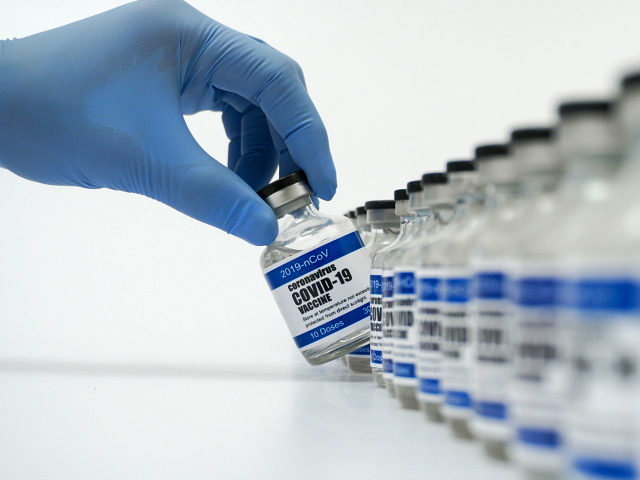Shanghai Fosun Pharmaceutical Group, a Chinese pharmaceutical group, announced Wednesday it had inked a deal with German company BioNTech to purchase 100 million doses of the Chinese coronavirus vaccine it had developed with American company Pfizer — the first vaccine approved for use in the United States.
Shanghai Fosun co-owns Sinopharm Group alongside the government of China, a company developing its own coronavirus vaccine candidate. At press time, the Sinopharm vaccine candidate is believed to be about 86 percent effective, a significantly lower rate of functionality than the Pfizer option. Pfizer and BioNTech have reported their vaccine tested to be 95 percent effective in stopping Chinese coronavirus infections.
Mass importing of a vaccine developed by an American company suggests that the Chinese state is not confident that its options — in addition to Sinopharm, the Chinese company Sinovac, whose vaccine candidate is currently being tested in Brazil — will be of sufficient quality or produced quickly enough to inoculate the entire country.
The Food and Drug Administration (FDA) issued an emergency use authorization for the Pfizer/BioNTech vaccine last week, allowing its administration in America. Canada and the United Kingdom have also approved the vaccine. It is the first vaccine for coronavirus approved for use in the United States.
Shanghai Fosun Pharmaceutical Group announced Wednesday that it had cut a deal directly with BioNTech to purchase 100 million doses of its coronavirus vaccine — enough for 50 million people, as the vaccine requires two doses — which would begin arriving in China in 2021. The vaccines would be made in Germany, not America, given the direct deal with BioNTech.
“We are pleased to reach the supply agreement with BioNTech, which is an important step in Fosun Pharma and BioNTech’s efforts to achieve vaccine accessibility and affordability in China,” Wu Yifang, the CEO of the Chinese company, reportedly said of the deal, according to the South China Morning Post.
The deal, Shanghai Fosun explained, was intended to ensure that all Chinese citizens receive a vaccine — suggesting Beijing does not believe it can source a functional vaccine entirely domestically. Shanghai Fosun agreed to pay $152 million for the first 50 million doses and would pay for the second half after receiving authorization to use it from the ruling Communist Party. The Chinese company insisted on describing the purchase as being of “at least” 100 million doses, leaving the door open to purchase more of the American vaccine if necessary.
A Sinopharm subsidiary had announced on Sunday that it expected to manufacture 1 billion doses of its vaccine candidate, which it expected to be publicly available by the end of December, through 2021. Sinopharm, a Shanghai Fosun-affiliated company, has administered its experimental coronavirus vaccine to 1 million people within China as of November, the company announced that month.
“In terms of emergency use, the vaccines were applied to nearly a million people and there has not been a single case of a serious adverse event. People have had only mild symptoms,” company chairman Liu Jingzhen announced told a Chinese media outlet. “Until now, all our progress, from research to clinical trials to production and emergency use, we have been leading the world.”
At the time, Pfizer and Moderna had announced they had documented far higher effectiveness rates on their vaccine candidates, prompting the head of China’s Center for Disease Control and Prevention, Gao Fu, to tell the world, “Pfizer and Moderna said their vaccines were very effective, but please trust me, the Chinese vaccines are very effective, too.”
Following the news of the Shanghai Fosun purchase, Chinese state media companies published stories that provincial Communist Party governments had cut deals with Shanghai Fosun subsidiary Sinopharm and its main competitor, Sinovac, to ensure that Chinese citizens would have to pay only $30.57 per dose of their vaccines.
Pfizer announced recently, Chinese state media itself noted, that its more effective vaccine would cost $20 a dose.
The Global Times emphasized reports that Chinese officials were fervently training health workers on how to administer coronavirus vaccines.
“Chinese authorities have said on many occasions that domestically made vaccines are likely to be available by the end of this year,” the Global Times noted, adding that Chinese government-approved “experts” believed that demand for the vaccine in China would be low because the Communist Party had so effectively contained the pandemic it created.
The Global Times also ominously noted that its experimental vaccine candidates should be distributed to “areas with sporadic COVID-19 [Chinese coronavirus] outbreaks,” naming Xinjiang, home to the majority of the nation’s ethnic Uyghur minority, on the top of that list.
While Sinopharm continues to market its vaccine candidate, competitor Sinovac faced challenges in Brazil this week, where it is conducting much of its research. In a statement regarding the potential that Sinovac’s product, named “CoronaVac,” would receive emergency use authorization in Brazil as it did in China, the Brazilian Health Regulatory Agency (Anvisa) stated that the Communist Party had not clarified sufficiently what made it confident in the product.
“This vaccine has already received emergency use authorization in China since June of this year,” Anvisa said in a statement. “The Chinese criteria to issue authorization for emergency use in China are not transparent and there is no information available over the criteria currently used by Chinese agencies to make this decision.”
Brazilian President Jair Bolsonaro has vocally opposed importing any Chinese vaccine candidates or mandating citizens take them.

COMMENTS
Please let us know if you're having issues with commenting.